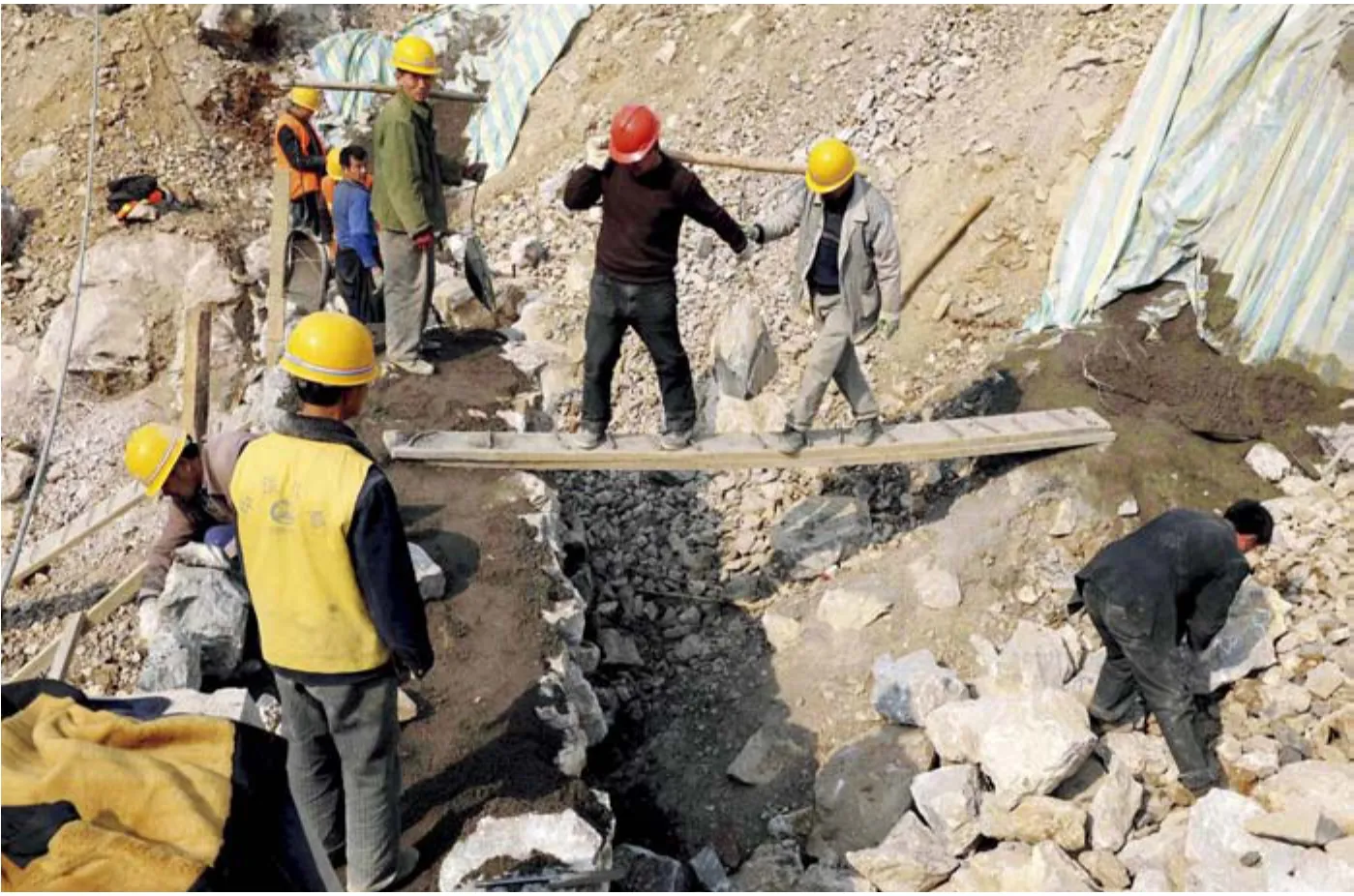A New Kind of Poverty Relief
2011-10-14ByYINPUMIN
By YIN PUMIN
A New Kind of Poverty Relief
By YIN PUMIN

Impoverished farmers in west China pursue a prosperous life in places more habitable than their original residences
Two years ago, when Wang Chengxiang, a farmer from the mountainous area of Qingchuan County in southwest China’s Sichuan Province, was helpless in getting his house rebuilt after the devastating Wenchuan earthquake in May 2008, one of his relatives convinced him to move to Huijue Town in Luojiang County, Deyang City in the province.
In the town, there was a two-storey house abandoned by a farmer who moved to the city 10 years ago. Wang bought the house for 46,000 yuan ($6,921), and started his new life there.
According to statistics from local governments, more than 5,200 farmers in Qingchuan have resettled in other areas after the Wenchuan earthquake. In Kaixian County in Chongqing Municipality more than 3,500 farmers have moved to plain areas from mountainous areas since October 2009.
Day to day struggle
On April 10, Lan Yinghai, a farmer at Muzu Village in Hanniu Town in Sichuan’s Xiaojin County, was fretting at his undecorated new house.
The village is located on a 3,200-meterhigh mountain. After the Wenchuan earthquake, the government encouraged local farmers to rebuild their damaged houses. Each household could receive 20,000 yuan ($3,077) in subsidies and borrow another 20,000 yuan from the bank. Lan didn’t want to lose this chance. On top of the subsidy from the government and the loan from bank, he also borrowed another 20,000 yuan from his friends and relatives. But, after building the house, he had no more money to decorate it.
“The house was completed in April 2009, but my family is still unable to move in, because I don’t have enough money with my little earnings to furnish it,” said the 39-year-old Lan, adding except limited felds on a hill, there are few chances for farmers like him to make money living in mountains.
There are four members in Lan’s family but they only have 0.4 hectares of farmland.
“We cannot make extra money from the farmland because the grain yields are just enough to satisfy my family’s needs,” Lan said.
Compared to Lan, the living conditions of his fellow villager Yang Xuede are even worse. In order to get easy access to water, Yang built his house near the river running through the valley at Muzu Village.
In the dry season, it is convenient for the family to live there. But, when the rainy season comes, the area becomes dangerous.
“In 1997, there was a mudslide and we were scared to move to a place far from the river. In 2008, a bigger mudslide damaged half of my family’s 0.4 hectares of farmland and pushed the river to the front of my door. Since last year, we have to move to a relative’s house in the rainy seasons,” Yang said.
Hanniu lies deep in the Qionglai Mountains and local farmers live between 2,800 meters and 4,800 meters above sea level. Traffic here is very inconvenient and geological disasters often occur. Each year, seven to eight big mudslides hit the town and the government has to spend 400,000 yuan-500,000 yuan ($61,543-$76,929) to repair damaged roads.
Lan said local villagers had long dreamed of leaving the impoverished mountainous areas and moving to plain areas. “But we have no place to go. Even if we have a place to move in, we still do not have enough money to build new houses,” said Lan.
The situation of Hanniu is the epitome of the hard life led by farmers living in povertystricken mountainous areas and geological disaster-prone areas in China’s vast western regions.
Yong Tianxiong, Director of the Poverty Alleviation Office of Qingchuan County, said all farmers living in uninhabitable areas should be relocated to other habitable places.“But it is a huge challenge to the government to provide houses for the expected tens of millions of farmers moving out of mountains,” he said.
Wasted resources
While farmers in mountainous areas lead hard lives and have no place to move, a large number of fertile farmlands and houses in many agricultural areas are left unattended.
In Sichuan’s Jianwei County, most young rural residents have gone to work in cities, leaving their houses in villages unoccupied and farmlands uncultivated.
In 2010, the Sichuan Provincial Agricultural Department conducted a survey on 210 farmer households in 27 villages in Ziyang and Meishan counties. It found 35.2 percent of surveyed households had abandoned their farmlands. The area of abandoned farmland accounted for 8.8 percent of the total farming area in the two counties.
Another survey by the Sichuan Provincial Academy of Social Sciences in Jiahe Town, Quxian County, a major agricultural county in northeast Sichuan, also found 35 percent of the town’s population had moved to cities and the proportion of the area of abandoned farmland reached 10 percent to the total.
Meanwhile, although many farmers have settled in cities and occupied a large number of urban resources, they still have land for housing construction purposes in villages. Since 1997, about 6.5 million farmers have moved to urban areas in Chongqing and the rural lands for housing construction purposes should accordingly be reduced by 1,500-1,600 square km. However, according to statistics from the Chongqing Administration of Land, Resources and Housing, the real reduction is only 73 square km, accounting for less than 5 percent of the estimate.
In Chongqing’s Jiangjin District, 23 percent of its 400,000 farmer households have abandoned their farmlands and nearly 2,000 hectares of farmers’ housing lands there are not effectively used.
Substitute transfer
In recent years, more farmers living in poverty-stricken mountainous areas and geological disaster-prone areas have moved to areas with sound living and farming conditions on their own. They live in the houses of people who have moved to cities and cultivate their land with consent from the latter and pay for the use. Experts call the movement “substitute transfer.” They think the new mode is a win-win solution to current poverty-relief challenges in China’s mountainous areas.
The method is believed to help reduce relocation costs of distressed farmers and solve resettled farmers’ problems of having no farmlands at all.
In Qingchuan, there is almost no safe place to build houses after the Wenchuan earthquake in 2008. The costs of building houses there are fairly high due to complex groundwork consolidation efforts. But farmers can buy abandoned houses outside Qingchuan, which is 50 percent lower.
Meanwhile, the mode can help reduce the state’s poverty-relief costs. According to Yong, in the most isolated Magong Town in Qingchuan, there are only about 1,300 permanent residents but the local government has to spend more than 5 million yuan ($769,231) every year to guarantee the smooth operation of the town’s basic infrastructures such as roads, power grids, water supply systems and telecom networks. “After local farmers move to more habitable areas, the money can be invested in development projects,” Yong said.
“After moving to the plains, farmers will no longer face threats from geological disasters and their lifestyle will thoroughly change. They will have more chances to shake off poverty,” Yong said. “Those farmers can cultivate more fertile farmlands and conditions for transportation and education of their children will be improved remarkably.”
Lingyun County in Baise City in Guangxi Zhuang Autonomous Region lies deep in mountains. In the county, there are about 50,000 farmers whose average annual net income is still less than 1,196 yuan ($184). Liu Guoshun, a local farmer, had lived in the most remote town in the county for seven years and his household’s annual net income was less than 3,500 yuan ($538). In 2010, Liu moved out of the mountains.“Our life has improved rapidly. Within one month, I earned more than 5,000 yuan ($769) working in a pig slaughterhouse,”Liu said.
In most cases, the resettled farmers made the movement on their own and with help of relatives, without receiving subsidies from the government.
Experts say the voluntary, scattered and market-oriented method can prevent some disadvantages of government-run resettlement programs and resettled farmers can easily live in harmony with local residents.
Zhou Qinghua at Erlong Village in Huijue Town in Sichuan’s Deyang City said there were no conflicts between resettled farmers and local farmers who make money from housing sales and land contracts.
Finally, the new migration method can solve problems concerning unattended rural houses and farmlands, said Guo Zhengmo, Director of the Institute of Economy of the Sichuan Provincial Academy of Social Sciences.

CHEN SHUGEN
